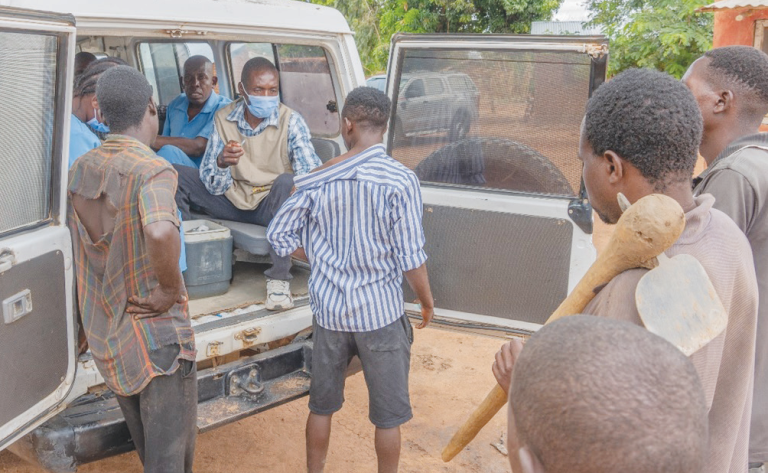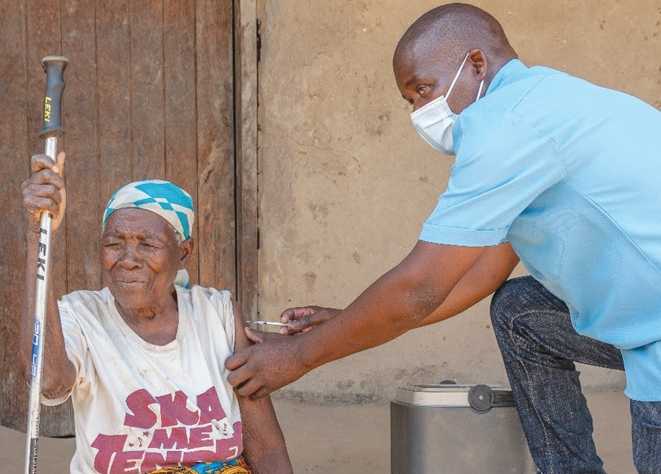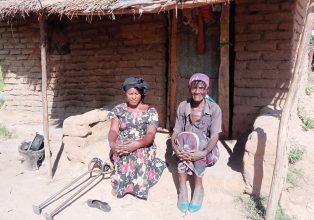Covid jab at doorsteps
In her 90s, Elfas Nyaukandawire has lost count of her years as well as the tenacity to walk and work. Advanced age increases the risk of dying from Covid-19 and also denies Nyaukandawire access to vaccines, the only weapon against the virus.
“I know the sting of death,” Nyaukandawire says. “I’ve lost all my seven children and their children need my care.”

The granny of two waited 10 months for her first Covid-19 vaccine.
“I’ve been hearing from the radio that people aged at least 60 years are severely affected by Covid-19, but couldn’t get vaccinated because I couldn’t walk to Rumphi District Hospital. I don’t have the energy or money to make the trip,” she laments.
Nyaukandawire finally got the vaccine from her verandah on December 17 2021 when her neighbour Rose Nyasulu stopped a vaccination van passing through Kaiwale Village, almost 10 kilometres west of Rumphi Town. Motorcyclists charge K2 000 for a round trip.
“I feel lucky to be protected. I couldn’t go to the hospital using my walking stick and frail limbs. I don’t work or get much crop yield, so the money from well-wishers is best spent on daily needs, especially food,” she explains.
Her sigh of relief exposes how confining vaccinations to health facilities silently excludes people who need them most, including the elderly and those with comorbidities.
By contrast, the vaccinators on the move branched to her homestead and asked her not to queue in the sun, but to get vaccinated while relaxing in the shade of her grass-thatched house.
Nyasulu, 61, was all smiles to see the old woman receiving her first vaccine.
She stated: “I know Covid is deadly. Now that I’m fully vaccinated, the virus won’t overpower my body defences.
“However, my sister in marriage needed it more because the elderly and persons with diabetes, high blood pressure and other underlying conditions are highly likely to die if they catch the virus. She needed it more.”
Nyasulu considers the mobile vaccination campaign a big boost for vulnerable persons unlikely to walk to health facilities.
“When vaccines come home, we don’t spend our limited funds or time. Even those who were hesitant to get vaccinated change their minds,” she observes.

About 30 people in Kaiwale got the vaccine the day Nyasulu put a close to futile trips to Rumphi. She says the search for the second dose cost her enough money to buy a bag of cement for constructing a chicken house.
“I made four trips to Rumphi in June when the country run out of Covid-19 vaccines, so when I saw the branded minibus with Covid-19 messages blaring in loudspeakers, I knew the much-sought vaccine was here,” she says.
The fully vaccinated farmer envisions the AstraZeneca vaccine keeping her healthy and energetic to look after her family, tobacco, groundnuts and maize garden.
The Ministry of Health with support from Unicef through the Kamuzu College of Health Sciences has deployed 30 community outreach vans, which contribute 60 percent to the country’s daily vaccination coverage.
Dr Mike Chisema, head of the Expandend Programme on Immunisation, reports that the daily uptake of Covid-19 vaccine surged to 29 000 from a meagre 1 000.
“The 60-day express helped the country utilise about 714 000 doses within two months. This includes 130 000 doses which were expected to expire on November 30 and 584 000 that had to be used by December 31,” he states.
Innocent Chiweza, senior health surveillance assistant at Bolero Health Centre who led the vaccinators to Nyaukandawire’s home, says it is pleasing when people stop them to get shots.
“When the vaccine was confined to health facilities, few people were coming and the granny had no chance. Even fake news was spreading faster than accurate information,” she says.
The vaccination teams also tackle misinformation both publicly and privately.
John Kuwanda, district coordinator of the Expanded Programme on Immunisation in Rumphi, says Nyaukandawire’s smile personifies how the van with a public address system is improving access to the vital vaccine.
He explains: “It is not easy to vaccinate every eligible person, including the elderly, because some people in Rumphi still travel 30 to 40km to get to their nearest health facility.
“The vaccination express has saved them from the financial hardship to get vaccine. This confirms that with proper transport, cold chain, communication and community leaders’ involvement, we can take Covid-19 vaccines beyond the reach of routine vaccination campaigns.”
Almost 920 people in Rumphi were vaccinated the day Nyaukandawire was vaccinated at home.
“Previously, we needed a week to vaccinate 900 people, but the weekly figures have risen to 4 000 with people stopping the van when they need a jab,” Kuwanda brags.
HSAs in Rumphi have almost met the district’s target to vaccinate 36 000 by the New Year’s Eve.
“Almost 27 400 people had received their first dose by December 17. With few days to go, we’ll surely beat the target,” he said, saluting the district health supervisory committee and environmental health officer for constantly checking on the teams.
“We are motivated to beat the targets because we know our supervisors care about it.”





